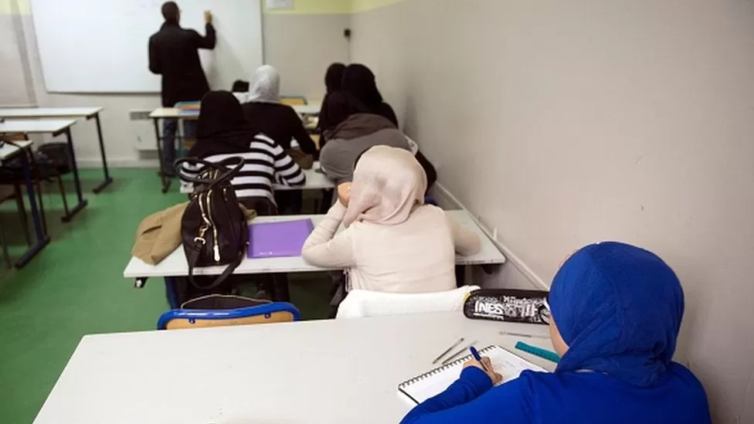The French education minister has said that nearly 300 pupils arrived at school on Monday wearing the abaya, the long Muslim robe which was banned in schools last week.
Most of the girls agreed to change into other clothes.
According to official figures, 298 girls - mainly aged 15 or more - turned up at school in the banned garment.
Under instructions laid down by the ministry, there followed in each case a period of dialogue with school staff.
Most girls then agreed to dress differently and were able to start classes.
However, 67 girls refused to comply and were sent home.
A further period of dialogue with their families will now ensue. If that fails, they will be excluded.
Set against the 12 million school boys and girls who started term on Monday, the government believes the figures show that its ban has been broadly accepted.
However, a legal challenge by a group representing some Muslims goes before the courts later today.
At the end of August, the education minister announced that pupils would be banned from wearing the loose-fitting full-length robes worn by some Muslim women in France's state-run schools at the start of the new school year on 4 September.
France has a strict ban on religious signs in state schools and government buildings, arguing that they violate secular laws.
Wearing a headscarf has been banned since 2004 in state-run schools.
The move comes after months of debate over the wearing of abayas in French schools.
The garment is being increasingly worn in schools, leading to a political divide over them, with right-wing parties pushing for a ban while those on the left have voiced concerns for the rights of Muslim women and girls.
In 2010, France banned the wearing of full-face veils in public, provoking anger in France's five million-strong Muslim community.
France has enforced a strict ban on religious signs at schools since the 19th Century, including Christian symbols such as large crosses, in an effort to curb any Catholic influence on public education.
Reflecting its changing population, it has updated the law over the years to include the Muslim headscarf and Jewish kippa, but abayas have not been banned outright until now.
Latest Stories
-
Chief of Staff rolls out ‘Walk with Julius’ initiative to encourage healthy living, calls on corporate Ghana to join JoySports Invitational Tournament
37 minutes -
NSMQ 2025: St Peter’s SHS claims 4th Eastern Regional title after intense showdown with Okuapeman and Pope John’s
48 minutes -
Tera Hodges confirmed as speaker for Africa’s Women’s Day Virtual Celebration 2025
1 hour -
Gospel artiste Terry Johnson releases soulful new single “Ohe yɛ naakpɛɛ”
2 hours -
Nearly 200 Ghanaian students stranded as gov’t owes University of Memphis $3.6m
2 hours -
At least 14 dead in South Korea floods and landslides
3 hours -
You’ve kept to the objective – Chief of Staff Julius Debrah hails MGL
4 hours -
Cape Coast hosts final leg of National Talent Identification Program for Para athletes
5 hours -
ESG and Boardroom Decisions: How Non-Financial Drivers Shape Financial Outcomes
5 hours -
Robust anti-laundering fight critical for regional stability – Veep
10 hours -
Car ploughs into crowd outside LA nightclub, injuring 30
10 hours -
GNAT President calls for parliamentary legislation to protect reinstated PTAs
12 hours -
NPP Abanga blames his NDC twin brother for his misfortune
14 hours -
NPP Abanga breaks ranks to shield NDC twin brother in ‘galamsey’ accusations
14 hours -
Saminu Abdul Rasheed smashes national record again with 9.84s sprint in Georgia
15 hours

